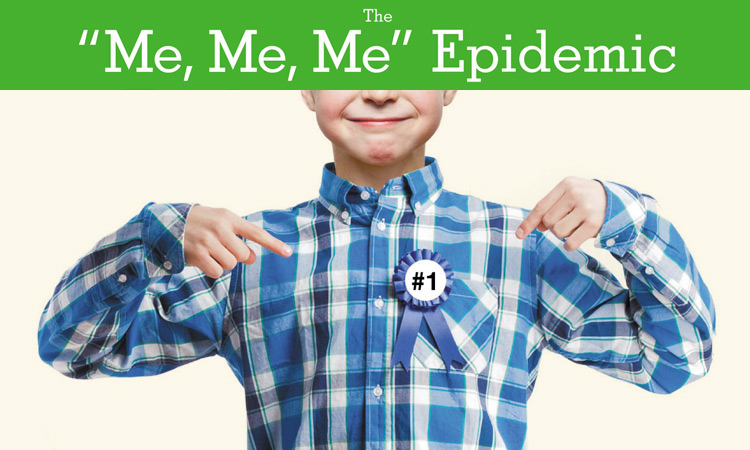We’ve all met an entitled child. I’m not referring to the child whose parents are wealthy enough to provide exceptional things like a private school or summer camp. The entitled child is a brat, raised to believe—and insist—that he deserves what he wants, when and how he wants it, regardless of his behavior or whether he’s done anything to earn or deserve it.
I was raised in a traditional environment, where my parents—not the children—set the rules. My father’s word was the final word, and we were expected at a young age to help out at home and have a good work ethic. It has helped provide the important values and learning experiences that have guided my adulthood.
Amy McCready discusses the impact that an over-indulgent parenting style has on children in her newest book, The “Me, Me, Me” Epidemic. Used pervasively since the 90s, we’ve all seen the “helicopter parent”—hovering over their teen or young adult as fiercely as she did when her child was a baby or toddler, making sure nothing unpleasant affects her offspring.
McCready asserts that although these parents believe they are doing the best for their children, over-indulgence is actually keeping their kids from developing important life skills. For example:
- The entitled child often blames others for his problems instead of figuring out what part he played in creating his current situation. This may keep him from developing problem solving skills.
- It’s unrealistic for anyone to believe a child can be happy every minute of every day without any participation on her part. Raising children to believe this sets false expectations and may cause them to be unhappier in the long run.
- It’s important to delay gratification—to work for a goal instead of having it handed on a plate. Otherwise, the child grows up, gets their first job, only to discover they actually have to put in the time and effort to master a skill, which can be a real wakeup call.
It’s also important for children to learn the consequences of their actions. McCready believes children learn from the consequences of their actions better than they learn from a lecture. Learning from our mistakes—feeling bad when we make them—is part of becoming a conscientious and self-aware adult. Learning to get out of uncomfortable situations helps develop our problem solving and critical thinking skills, too. In the following excerpt, McCready explains more:
Consequences will always be a very important part of an un-entitled home. That being said, they are not meant to be the first line of defense against bad behavior. If you find your kids are constantly faced with negative consequences, you might need to do some more groundwork in other areas of positive parenting. Your first action should be to increase your child’s feelings of belonging and significance using Mind, Body and Soul Time and other positive tools (Decision-Rich Environment, What Is Your Plan?, Take Time for Training, etc.) to prevent bad behavior from happening in the first place. Also, since you’ll be setting up consequences in advance, consequences work best for repeated misbehaviors—you’ll use other tools to address first- and second-time offenses.
There are two types of consequences: natural and logical. It’s important to understand the difference so you can use them both effectively.
Natural Consequences are something you allow your child to face. [Logical consequences are one you impose as a parent. If a child doesn’t come home at the time you agreed on, she won’t be allowed to go out next weekend.] Essentially, once you’ve warned your child in advance about the possibility of an unsavory outcome, you do nothing and let the consequences play out. If your child refuses to wear a coat, she gets cold. If he leaves toys out in the yard, they get dirty, lost or broken. If she refuses to eat the apple you brought her for a snack on the way to her clarinet lesson, she’ll get hungry. Once these have played out, you can discuss the consequence if your child is open to talking. But resist the urge to drive your point home with a “See? You didn’t wear your coat and now you’re cold!” The lesson will evaporate as your child fumes.
To put Natural Consequences to use, follow these steps:
1. In a calm moment, briefly warn your child in advance what could happen if she keeps up the negative behavior. For instance, if your nine-year-old has been bossing around her friends, you can gently let her know, “Your friends probably don’t enjoy being told how to play all the time. If you keep trying to boss them around and control what they do, they might not want to play with you anymore.”
2. Let the Natural Consequence happen. Next time your daughter is telling her friends exactly how to dress their Barbies for the big dance, keep quiet, even if you can tell her friends are getting annoyed.
3. Skip the I told you so and offer empathy and guidance as needed. When your daughter is bemoaning the fact that her best friend doesn’t want to come over, empathize. Then instead of saying “Of course she doesn’t—you always boss her around!” ask “What could you do differently the next time you have a playdate?” and role play how respectful conversations with friends can sound. Your daughter will soon get the memo to play nicely.
If you’re looking for a book on parenting that’s easy to read and helpful when it comes to raising un-entitled children, you would enjoy The Me, Me, Me Epidemic.
Excerpted from The “Me, Me, Me” Epidemic: A Step-by-Step Guide to Raising Capable, Grateful Kids in an Over-Entitled World by Amy McCready. © 2015 by Amy McCready. Jeremy P. Tarcher, Penguin Group USA, Penguin Random House.

Rose Caiola
Inspired. Rewired.
Click here to see more of Rose’s tips for healthy and happy relationships


